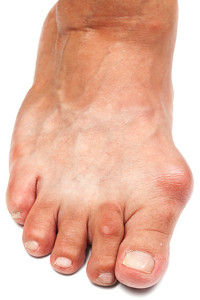
Dr. Kenneth Rosenthal
Dr. Jonathan C. O’Quinn
Dr. Michael J. Price

Dr. Kenneth Rosenthal
Dr. Jonathan C. O’Quinn
Dr. Michael J. Price
 If you have a bunion, you may be experiencing uncomfortable foot conditions that may develop as a result of this ailment. The bony area that forms on the side of the big toe may lead to inflamed and callused skin, which may make walking difficult to accomplish, depending on the severity of the bunion. Research has shown the formation of bunions may be caused by genetic traits, in addition to medical conditions that may be present, which may include cerebral palsy or rheumatoid arthritis. Additionally, if you choose to wear shoes that are too tight, a bunion may gradually form, and proper treatment should begin as soon as possible. Bunions may be prevented by wearing shoes that fit correctly, leaving ample room for the toes to freely move about in. If you feel you have developed a bunion, it is suggested to speak with a podiatrist to learn about proper treatment techniques.
If you have a bunion, you may be experiencing uncomfortable foot conditions that may develop as a result of this ailment. The bony area that forms on the side of the big toe may lead to inflamed and callused skin, which may make walking difficult to accomplish, depending on the severity of the bunion. Research has shown the formation of bunions may be caused by genetic traits, in addition to medical conditions that may be present, which may include cerebral palsy or rheumatoid arthritis. Additionally, if you choose to wear shoes that are too tight, a bunion may gradually form, and proper treatment should begin as soon as possible. Bunions may be prevented by wearing shoes that fit correctly, leaving ample room for the toes to freely move about in. If you feel you have developed a bunion, it is suggested to speak with a podiatrist to learn about proper treatment techniques.
If you are suffering from bunions, contact one of our podiatrists of Eastern Carolina Foot & Ankle Specialists. Our doctors can provide the care you need to keep you pain-free and on your feet.
What Is a Bunion?
A bunion is formed of swollen tissue or an enlargement of boney growth, usually located at the base joint of the toe that connects to the foot. The swelling occurs due to the bones in the big toe shifting inward, which impacts the other toes of the foot. This causes the area around the base of the big toe to become inflamed and painful.
Why Do Bunions Form?
Genetics – Susceptibility to bunions are often hereditary
Stress on the feet – Poorly fitted and uncomfortable footwear that places stress on feet, such as heels, can worsen existing bunions
How Are Bunions Diagnosed?
Doctors often perform two tests – blood tests and x-rays – when trying to diagnose bunions, especially in the early stages of development. Blood tests help determine if the foot pain is being caused by something else, such as arthritis, while x-rays provide a clear picture of your bone structure to your doctor.
How Are Bunions Treated?
If you have any questions, please feel free to contact our office located in Greenville, NC . We offer the newest diagnostic and treatment technologies for all your foot care needs.